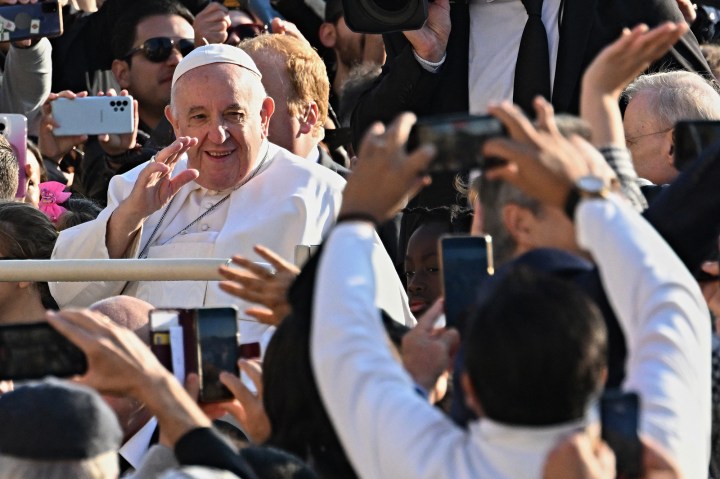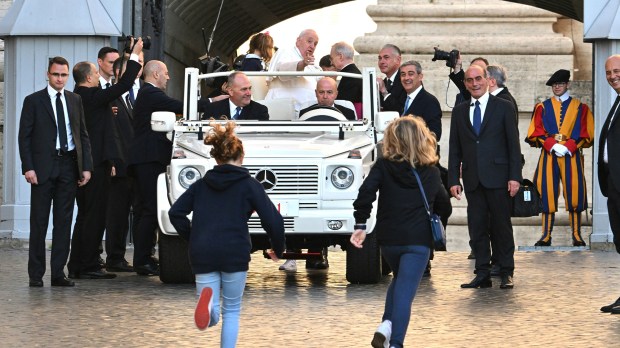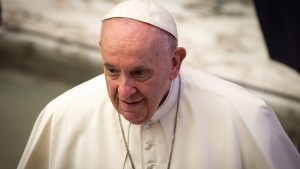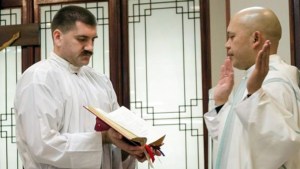Prayer, self-knowledge, and now desire. Pope Francis is on the third element, the third “ingredient,” in order to successfully discern.
“Discernment is a form of searching,” he said, “and searching always stems from something we lack but somehow know, that we intuit.”
The Pope is drawing on a special emphasis of his Jesuit spirituality in dedicating the Wednesday audiences to the theme of discernment. This October 12, he considered this type of “knowledge” that is referred to by the term “desire.”
Stars
At root, [desire] is a nostalgia for fullness that never finds full fulfillment, and is the sign of God’s presence in us. Desire is not the craving of the moment, no. The Italian word, desiderio, comes from a very beautiful Latin term, this is curious: de-sidus, literally “the lack of the star.” Desire is the lack of a lodestar, the lack of the reference point that orients the path of life; it evokes a suffering, a lack, and at the same time a tension to reach the good that we miss. Desire, then, is the compass to understand where I am and where I am going, or rather it is the compass to understand if I am still or if I am moving; a person who never desires is a person who is static, perhaps ill, almost dead. It is the compass to know if I am moving or if I am standing still. And how is it possible to recognize it?
Pope Francis explained how a sincere desire goes deep, and why is continues even when faced with difficulties and setbacks. He compared it to feeling thirst; if we don’t find something to drink, the thirst doesn’t go away. In fact it grows until we’re almost obsessed with quenching our thirst.
“Obstacles and failures do not stifle the desire, no; on the contrary, they make it even more alive in us,” he said.
These true desires, then, are not a “momentary craving or emotion.” They move us to set limits and say no to other things.
He said: “Desire makes you strong, it makes you courageous, it makes you keep going forward, because you want to arrive at that: ‘I desire that.'”
If you find yourself grumbling, beware, it is almost a sin, because it stops desire from growing.
How much do we want?
And a value is more easily achievable when it is attractive, he explained. “Being good is something attractive, we all want to be good, but do we have the wish to become good?”
It is striking that Jesus, before performing a miracle, often questions the person about their desire: “Do you want to be healed?” And at times this question seems out of place, it is clear the person is sick! For example, when he meets the paralytic in the pool of Bethesda, who had been there for many years and never managed to seize the right moment for getting into the water, Jesus asks him: “Do you want to be well?” (Jn 5:6). But how come?
In reality, the paralytic’s answer reveals a series of strange resistances to healing, which do not relate only to him. Jesus’ question was an invitation to bring clarity to his heart, to welcome a possible leap forward: to no longer think of himself and his own life “as a paralytic,” transported by others. But the man on the bed does not seem to be so convinced of this. By engaging in dialogue with the Lord, we learn to understand what we truly want from life.
This paralytic is the typical example of those who say “Yes, yes, I want, I want, I want,” but then “I don’t want, I don’t want, I don’t want, I won’t do anything.” Wanting to do something becomes like an illusion and one does not take the step to do it. Those people who want and don’t want. This is bad, and that sick man, there for thirty-eight years, but always grumbling; “No, you know, Lord, but you know when the waters move – that is the moment of the miracle – you know, someone stronger than me comes along, they enter, and I get there too late,” and he complains and laments.
But beware, because complaints are a poison, a poison to the soul, a poison to life, because they prevent the desire to go on from growing. Beware of complaints. When we complain in the family, married couples complain, one complains about the other, children about their father, priests about the bishop, or bishops about many other things… No, if you find yourself grumbling, beware, it is almost a sin, because it stops desire from growing.

Not enough desire
Pope Francis noted that a desire often “makes the difference between a successful, coherent and lasting project, and the thousands of wishes and good intentions with which, as they say, ‘hell is paved with’: ‘Yes, I would like, I would like, I would like…’ but you do nothing.”
Then the Pope observed how our era, which seems to promote “maximum freedom of choice” actually “atrophies desire.”
You want to be satisfied continually, which is mostly reduced to the desire of the moment. And we must be careful not to atrophy desire. We are bombarded by a thousand proposals, projects, possibilities, which risk distracting us and not permitting us to calmly evaluate what we really want. Many times, many times, we find people, think about young people for example, with their telephone in their hand, looking at it… “But do you stop to think?” – “No.” Always turned outwards, towards the other. Desire cannot grow in this way, you live in the moment, satiated in the moment, and desire does not grow.
Many people suffer because they do not know what they want from their lives, many of them; they have probably never got in touch with their deepest desire, they have never known: “What do you want from your life?” – “I don’t know.” Hence the risk of passing one’s existence between attempts and expedients of various kinds, never getting anywhere, and wasting precious opportunities. And so certain changes, though desired in theory, when the opportunity arises are never implemented, the strong desire to pursue something is lacking.
The Pope concluded by inviting us to hear Jesus ask the type of question that he asked so often in the Gospel, such as to the the blind man in Jericho: “What do you want me to do for you?” (Mk 10:51)
– let us think that the Lord today asks each one of us this: “What do you want me to do for you?” – how would we answer? Perhaps we could finally ask him to help us know our deepest desire, that God himself has placed in our heart: “Lord, may I know my desires, may I be a woman, a man of great desires”; perhaps the Lord will give us the strength to make it come true. It is an immense grace, the basis of all the others: to allow the Lord, as in the Gospel, to work miracles for us: “Give us desire and make it grow, Lord.”
Because he too has a great desire for us: to make us share in his fullness of life.



